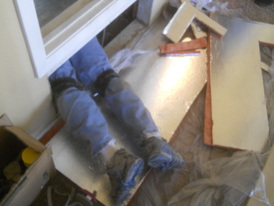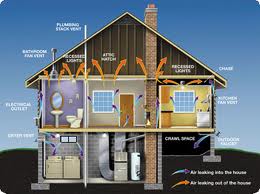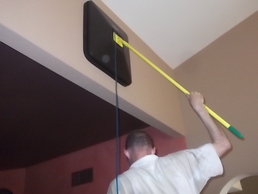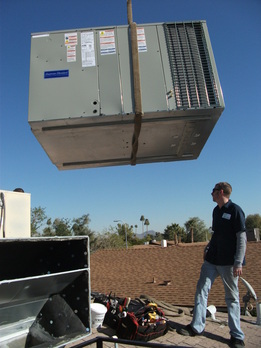No, not your exterior doors but your interior doors. Phoenix air conditioning companies have spread a lot of false information out there about closing your vents and doors. You want all the interior doors open or at least cracked to help circulate air back to the return. Here is a quick test you can do to check if your air conditioning costs are higher than they need to be. With the air conditioning on close a bedroom door and place your hand under the door to check if you can feel air coming out of the door. If you can feel air escaping, your room pressures are likely to be unbalanced every time the door is closed. Have an APS Home EnergyAuditor or SRP Home Energy Auditor do a home performance assessment of your home to actually measure the pressure in each room to determine if correction is needed.
What if you have teenagers or relatives are staying over or you have dogs that you don’t want in a room so you have to keep the door closed. Your energy auditor will probably recommend a transfer grille or jump duct be installed to relieve the built up room pressure and can go over the options with you.
Between 20% to 30% of an average home in the metro Phoenix area is wasting conditioned air in the summer and heated air in the winter to the attic. If 60% of your energy bill in the summer is from air conditioning and 20% of that air is not being delivered to the rooms it needs to go to, that can add up to quite a bit of change over 5 years. HVAC contractors do not seal the ductwork even on a new, high efficiency air conditioner which is like driving a Prius with a hole in the gas tank. Sealing your HVAC ductwork not only saves money on your heating and cooling bills, it brings less dust in the home too.
Making sure your exterior doors are well weather-stripped, air sealing any electrical and plumbing penetrations and sealing any recessed canned lights will help keep your conditioned air inside and the outside air outside. A leaky recessed canned light can increase heating and cooling bills by as much as $5 to $30 per canned light.
Air sealing your home will also help stop the stack effect which causes warm air to rise and cool air to enter the home. If you have a wood burning chimney, a chimney pillow will help stop heated air from escaping in the winter and save on your winter heating bills. If you only have some areas of doors that you can see light through there are easy upgrades you can do with filler weather-stripping to fill those voids without replacing your doors. I know what you are going to say, don’t houses have to breathe? Yes, you need to have a supply of fresh air into your house for health and safety concerns but it is better to seal your home as tight as possible and bring controlled ventilation in from the outside than live with a leaky home and rely on dirty attic air as your “fresh air” for the house to breathe with. An APS Energy Auditor or SRP Energy Auditor will calculate theacceptable “breathing rate” of your home and compare that number with the measured “breathing rate” or house leakiness from a blower door test.
Air Conditioning Saver #4 - Install shade screens in the summer and remove them in the winter
Shade screens help reduce air conditioning costs by blocking up to 90% of the sun’s conductive heat through the windows. Windows account for more than half of the heat gain into your home just because they are transparent and have almost no insulation value. If you do replace yourhome’s windows, gas filled, vinyl windows are the way to go.
Shade screens are typically clipped onto the frame and can be removed during Phoenix’s winter season when we use our heat to get maximum sun exposure to save on heating costs. APS and SRP also give rebates for shade screens if you don’t already have them.
Air Conditioning Saver #5 - Go up to R-38 insulation in your attic
Is it a big surprise that Phoenix attics can get hot in the summer? That huge temperature difference between the attic and the house is another cause of rising air conditioning costs. Against popular thought though, the notion that the quantity of insulation is more important than the quality is completely wrong. It is more important how the insulation was installed than how much you have and a home energy auditor will be able to properly assess your home and tell you how much higher your air conditioning bills are than they should be.
Air Conditioning Saver #6 - Check if there is a direct connection from your garage to the house.
This is not a commonly talked about cause of high air conditioning costs but I have found this problem in houses in Glendale, Scottsdale and Gilbert. The garage is another area that can get very hot in the summer and like I said before, temperature differences are the main driver of heat gain into homes. Using a blower door, your energy auditor will be able to test the house-to-garage connection that occurs above the drywall where you cannot see and estimate the heating and cooling loss occurring from the problem.
I personally know that finding a reliable HVAC contractor can be difficult. Even though you have a friend in the air conditioning business does not mean they will do a good job. I have been in too many homes where an AC contractor and friend installed a new unit and probably not purposely, but unfortunately cut way to many corners simply because that’s the way it’s been done for the last 20 years. After that is done, fixing any of their work is 10 times more difficult. First, the homeowner doesn’t want to point fingers at their buddy’s work, second the homeowner probably doesn’t know what “correct” looks like. Like a good handyman, every homeowner should have a good HVAC contractor.
Those are the 7 ways you can reduce your air conditioning costs dramatically. For others ways to save money on your utility bills be sure to check out our past articles and get up to speed on APS energy audits and SRP energy audits for your home.




 RSS Feed
RSS Feed
